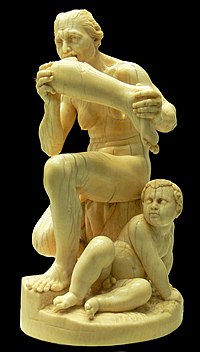Cannibalism (from Spanish caníbal, in connection with alleged cannibalism among the Caribs), also called anthropophagy (from Greek anthropos "man" and phagein "to consume") is the act or practice of humans consuming other humans. In zoology, the term cannibalism is extended to refer to any species consuming members of its own kind.


Among humans it has been practiced by various groups in the past in the Amazon Basin, North America, Africa, Fiji, New Zealand, Solomon Islands, New Caledonia,[5] and New Guinea, usually in rituals connected to tribal warfare.[citation needed] Fiji was once known as the 'Cannibal Isles'. The Chaco Canyon ruins of the Anasazi culture have been interpreted by some archaeologists as containing evidence of ritual cannibalism.[citation needed]
Care should be taken to distinguish among ritual cannibalism (sanctioned by a cultural norm) from cannibalism by necessity occurring in extreme situations of famine, and cannibalism by mentally disturbed people. There are fundamentally two kinds of cannibalistic social behaviour; endocannibalism and exocannibalism.

No comments:
Post a Comment